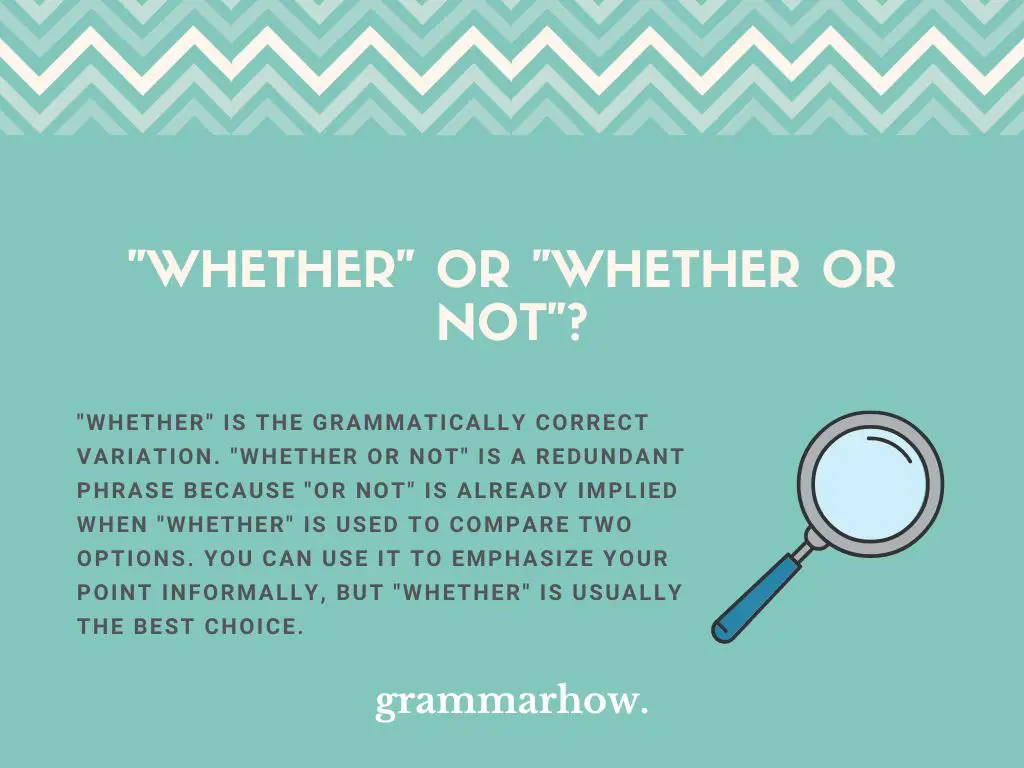“Whether” and “whether or not” are both common phrases in English. It would help to know when they apply, and this article will help you figure out when each one works. There are certain grammatical rules that make one more favorable than the other.
“Whether” or “Whether or Not”?
“Whether” is the grammatically correct variation. “Whether or not” is a redundant phrase because “or not” is already implied when “whether” is used to compare two options. You can use it to emphasize your point informally, but “whether” is usually the best choice.

“Whether” is a conjunction that implies a binary choice. You can tell this based on the two options that are usually presented by it:
- I did not know whether he was going to be there for me.
“Or not” also implies a binary choice, so it would be redundant to include it alongside “whether.” However, in spoken English, it can be common to hear it because it adds emphasis to the choice.
- I did not care whether or not they wanted me to listen.
- I did not care whether they wanted me to listen or not.
“Or not” can come either directly after “whether” or at the end of the phrase that comes after “whether.” The placement adds emphasis in different ways.
Whether
“Whether” works well on its own. It’s the correct choice if you’re writing formally because it’s the logical one that does not include a redundant phrase. You should use it to show that you are making a clear choice between two variables.
If you want to know how to use “whether” in a sentence, you can refer to the following:
- Regardless of whether you wanted to do that, I can tell that you had something else in mind.
- Whether she chose to do that was her own decision. I’m not going to tell her that she needs to stop.
- I thought you already knew whether you were going to college. Maybe you can spend a little more time thinking about it.
- I’m not sure whether they’re going to be kind to you. You really need to be careful when talking with people like that.
- Are you talking about whether they should go forward with this idea? I think they’d be foolish not to!
- I didn’t think about whether this was going to affect anybody else. I’m really sorry that it had to come to this!
Whether or Not
“Whether or not” is considered redundant by many. However, that doesn’t stop it from getting used. It is still fairly common to hear in spoken English because it allows the speaker to add emphasis to the decision that they are discussing.
“Or not” can come directly after “whether:”
- Whether or not it happens, I’ll be there.
Or at the end of the clause that comes after “whether:”
- Whether it happens or not, I’ll be there.
Here are some examples that explain how to use “whether or not” in a sentence:
- Whether or not you would like to do this is irrelevant. The fact remains that you should start thinking about other people.
- I’m not sure whether they were going to be here or not. Maybe you can look into it for me.
- I thought about whether or not we were needed, but I decided that it was still beneficial for us to come and see it happen.
- Whether they told you or not does not matter. I just wanted to know what you found out from them.
- Can you tell her whether or not you’re going to be able to come? I’m tired of her asking me about it.
- It’s going to be like that whether or not you work with us.
Is “Whether or Not” Redundant?
“Whether or not” is redundant. “Whether” and “or not” both try to do the same thing in a sentence. “Whether” decides between two variables, and “or not” decides between two variables. For that reason, it’s best to avoid using them together formally.
“Depends on Whether or Not” or “Depends on Whether”?
“Depends on whether” is better formally. It follows the standard formal rules that you should use when writing “whether” to make a choice. “Depends on whether or not” is better informally (i.e. in spoken English), where “or not” is an emphasizer.
- It depends on whether or not they’re all going to come along.
- It depends on whether she wants you there.

Martin holds a Master’s degree in Finance and International Business. He has six years of experience in professional communication with clients, executives, and colleagues. Furthermore, he has teaching experience from Aarhus University. Martin has been featured as an expert in communication and teaching on Forbes and Shopify. Read more about Martin here.
